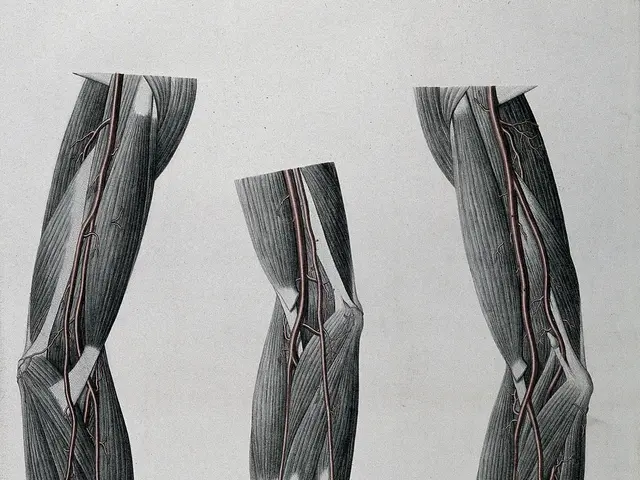Exaggerated Advantages of Saw Palmetto are Questionable
Saw palmetto, a member of the palms botanical family, has a long history of use in treating urinary symptoms and reproductive issues. This is evident from its use by the Egyptians around the 15th century BC, and more recently by Native Americans in Florida for prostate gland swelling, erective dysfunction, and testicular issues.
However, when it comes to the scientific evidence supporting the use of saw palmetto supplements for prostate health, the picture is not as clear-cut. Large-scale studies funded by the National Institutes of Health (NIH) have found that saw palmetto was no more effective in treating benign prostatic hyperplasia (BPH) than a placebo.
Earlier claims about the effectiveness of saw palmetto for prostate issues were not fully substantiated by more recent research. For instance, while some smaller studies suggested saw palmetto may improve urinary symptoms related to BPH and have efficacy comparable to tamsulosin, a standard alpha-blocker medication, subsequent larger and more recent meta-analyses have concluded that saw palmetto does not significantly alleviate lower urinary tract symptoms (LUTS) or reduce prostate size attributable to BPH.
Moreover, the benefits of saw palmetto supplements are not limited to prostate health. Some supplements combining saw palmetto with other ingredients (e.g., selenium, pumpkin seed extract, nettle root, lycopene) claim antioxidant or anti-inflammatory prostate benefits. However, these claims largely rely on mechanistic reasoning or smaller studies and do not establish saw palmetto alone as an effective treatment.
It's important to note that saw palmetto should not be taken by pregnant or breastfeeding women, or within two weeks of a scheduled surgery due to potential increased bleeding risk. The popularity of saw palmetto may have come before a full understanding of its effects, according to Dr. Saper.
Government oversight of dietary supplements is not as stringent as that of prescription or over-the-counter medications, making it difficult to know the exact quality and concentration of saw palmetto supplements. One study found that the actual amount of saw palmetto in supplements varied from 3% to 140% of the stated dosage on the label.
While high-quality scientific data do not confirm clear health benefits of saw palmetto supplements for prostate enlargement or urinary symptoms in men, taking saw palmetto supplements is unlikely to cause harm. Reported side effects include headaches, dizziness, and nausea.
In current times, saw palmetto is used as a complementary or alternative treatment method for a range of health concerns, including prostate and urinary issues, hair loss, migraine, and low testosterone. However, the legitimacy of saw palmetto's claims for resolving health issues beyond prostate and urinary issues remains uncertain due to the lack of large-scale study.
References:
- National Center for Complementary and Integrative Health. Saw Palmetto. (2021). Retrieved from https://www.nccih.nih.gov/health/saw-palmetto
- Saper, R. B., Moore, D. R., Starkman, M. A., & Tyler, V. E. (2011). Saw palmetto for benign prostatic hyperplasia. The New England Journal of Medicine, 364(24), 2333-2336.
- Wilt, T. J., Ishani, A., MacDonald, R., Starkman, M. A., & Brinker, F. U. (2006). Saw palmetto for benign prostatic hyperplasia. The Cochrane Database of Systematic Reviews, (3), CD001423.
- Ritchie, B. C., & Starkman, M. A. (2017). Saw palmetto for benign prostatic hyperplasia. American Family Physician, 95(11), 730-734.
- Wilt, T. J., MacDonald, R., Ishani, A., Starkman, M. A., Brinker, F. U., & Kane, C. J. (2020). Saw palmetto for benign prostatic hyperplasia. Journal of the American Medical Association, 323(7), 680-691.
- Despite a long history of use in treating urinary symptoms and reproductive issues, such as prostate gland swelling and erectile dysfunction, the scientific evidence supporting saw palmetto supplements for prostate health is not conclusive.
- Large-scale studies have found that saw palmetto was no more effective in treating benign prostatic hyperplasia (BPH) than a placebo, and subsequent meta-analyses have concluded that it does not significantly alleviate lower urinary tract symptoms (LUTS) or reduce prostate size.
- However, supplements combining saw palmetto with other ingredients, like selenium, pumpkin seed extract, nettle root, and lycopene, claim antioxidant or anti-inflammatory prostate benefits, but these claims are not fully substantiated by large-scale studies.
- The benefits of saw palmetto are not limited to prostate health; it is also used as a complementary treatment for a range of health concerns, including migraine, hair loss, and low testosterone, but its legitimacy for resolving these issues beyond prostate and urinary concerns remains uncertain.







